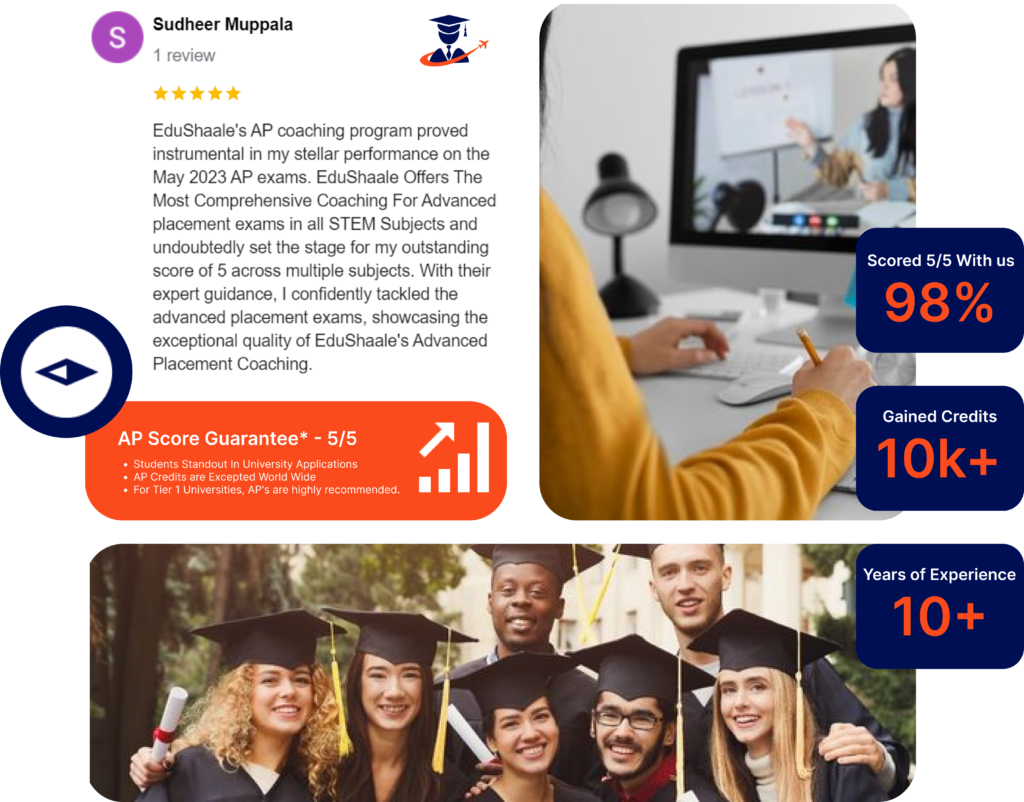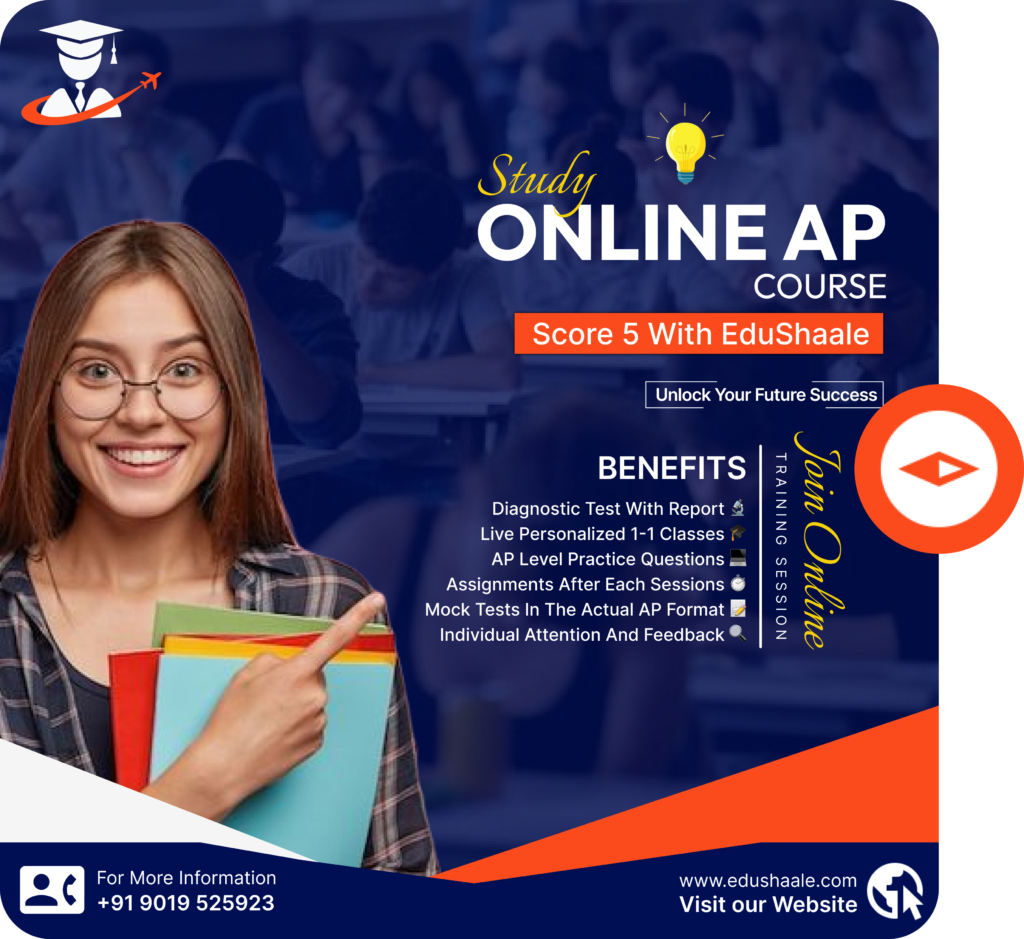AP Computer Science A Classes Online
Are you Looking for the AP Computer Science A Classes? Worry not, EduShaale has got your back
- No credit card required
- Free Demo Session
- Personalized 1-1 Classes
- Flexibile & Affordable


AP Coaching Program
- 1-1 coaching from Certified AP Trainers per subject
- 5000+ Practice Questions and Drills
- 1000+ Question Bank
- 5+ AP Style Mock Tests
- 50+ Topic Based Tests(On Demand Generation)
- 10+ years AP Past Exam Questions
- 20K+ Trusted AP Aspirants
- Parent Connect, Progress Tracking & Regular Follow-up
- 4.9/5 Rated by AP Aspirants
AP CS A Structure
40 questions 50% of the Score
The multiple-choice section includes individual, single questions as well as occasional sets of 2 questions. You’ll be asked to:
- Determine the required code segments to produce a given output
- Identify the output, value, or result of a given program code based on initial values
- Analyze program code for correctness, equivalence, and errors
- Describe the behavior and conditions that lead to results in a program
4 questions 50% of the Score
In the free-response section, you’ll respond to four questions with written answers:
- Question 1: Methods and Control Structures—You’ll be asked to write program code to create objects of a class and call methods, and satisfy method specifications using expressions, conditional statements, and iterative statements.
- Question 2: Classes—You’ll be asked to write program code to define a new type by creating a class and satisfy method specifications using expressions, conditional statements, and iterative statements.
- Question 3: Array/ArrayList—You’ll be asked to write program code to satisfy method specifications and create, traverse, and manipulate elements in 1D array or ArrayList objects.
- Question 4: 2D Array—You’ll be asked to write program code to satisfy method specifications and create, traverse, and manipulate elements in 2D array objects.
Course Content
The Computer Science A Exam will assess your comprehension of the programming concepts covered in the course units, as well as your ability to read and write computer program code.
Primitive Types
You’ll learn the fundamentals of Java, a programming language, as well as other foundational concepts for coding.
Topics may include:
- Primitive data types including int, double, and Boolean
- Evaluating arithmetic expressions in program code
- Using assignment operators to produce a value
- How variables and operators are sequenced and combined in an expression to create a result
On The Exam
2.5%–5% of exam score
Using Objects
You’ll explore reference data as a way to represent real-world objects in a digital world and discover methods to perform more complex operations.
Topics may include:
- Objects and classes as ways to describe instances, attributes, and behaviors
- Creating objects by calling constructors with and without parameters
- Utilizing class libraries, including Integer and Double
- Defining an object’s behavior using methods, including static and Math class
- Calling non-static void methods with and without parameters
- Using String objects and methods
- Using application program interfaces (APIs) and libraries
On The Exam
5%–7.5% of exam score
Boolean Expressions and if Statements
You’ll delve into the building blocks of algorithms and focus on using conditional statements to solve problems and control results.
Topics may include:
- Finding Boolean values with expressions involving relational operators
- Using conditional statements to execute different statements based on input values
- Building on conditional statements to create multiple possible outcomes
- Creating the same value using equivalent Boolean expressions
- Referencing objects with aliases
On The Exam
15%–17.5% of exam score
Iteration
You’ll learn about iteration, another building block of algorithms that are for repetition.
Topics may include:
- Creating a loop to run an expression repeatedly until certain conditions are met
- Standard arithmetic-based and String algorithms
- Representing iterative processes in code using for and while loops
- Nesting loop and iteration statements
On The Exam
17.5%–22.5% of exam score
Writing Classes
You’ll explore how real-world interactions can be expressed digitally by organizing behaviors and attributes into classes, and you’ll examine the legal and ethical implications of computer programming.
Topics may include:
- The makeup of a class, including whether attributes are public or private
- Setting an object’s attributes using constructors
- Using comments to describe the functionality of code
- Defining behaviors of an object using non-void, void, and static methods
- Where variables can be used in program code
- Breaking problems into smaller parts by creating methods to solve individual subproblems
- Intellectual property and ethical concerns in programming
On The Exam
5%–7.5% of exam score
Array
You’ll learn techniques and standard algorithms to work with collections of related data, known as data structures.
Topics may include:
- Representing multiple related items as array objects
- Traversing an array by accessing the elements using iteration statements
- Standard algorithms that utilize array traversals to perform functions
On The Exam
10%–15% of exam score
ArrayList
You’ll delve deeper into data sets, exploring ArrayList objects for larger amounts of data, as well as the privacy concerns related to personal data storage.
Topics may include:
- Representing collections of related object reference data using ArrayList objects
- Traversing an ArrayList by accessing the elements using iteration statements
- Standard algorithms that utilize ArrayList traversals to perform functions
- Searching and sorting using standard algorithms
- Ethical issues around data collections
On The Exam
2.5%–7.5% of exam score
2D Array
Now that you’ve explored 1D arrays, you’ll branch out into 2D arrays and experiment with data sets represented in a table.
Topics may include:
- Representing collections of data as arrays of arrays, or 2D arrays
- Traversing a 2D array by accessing the elements using nested iteration statements
On The Exam
7.5%–10% of exam score
Inheritance
You’ll learn how to manipulate programming without altering existing code by using subclasses to create a hierarchy.
Topics may include:
- Using common attributes and behaviors to group existing objects into superclasses
- Defining and overriding methods within subclasses and superclasses
- Creating references using inheritance hierarchies
- Associating subclass objects with superclasses to create polymorphism
On The Exam
5%–10% of exam score
Recursion
You’ll work on solving larger problems by solving smaller, simpler versions of the same problem using recursive methods.
Topics may include:
- Executing recursive methods
- Searching and sorting using binary search and merge sort algorithms
On The Exam
5%–7.5% of exam score
Why us for your AP Computer Science A Classes?
At EduShaale, we take immense pride in our commitment to providing a truly personalized and 1:1 learning experience for each student. Our approach ensures that you receive not just education but individualized attention, targeted guidance, and a learning journey tailored specifically to your unique needs and pace.
Embark on a journey of comprehensive coverage of AP Computer Science A concepts with our program, featuring over 20+ hours of dedicated instruction. Immerse yourself in the subject matter, master essential topics, and build a robust foundation that goes beyond conventional teaching methods.
Recognizing that every student has a unique learning pace, our classes are meticulously paced according to your individual needs. This flexibility empowers you to grasp concepts thoroughly, ensuring a comfortable progression through the curriculum.
Homework assignments form an integral part of our program. Upon completing each unit, engaging homework is provided to reinforce your understanding and allow you to apply the knowledge acquired in a practical context.
We are unwavering in our commitment to ensuring that your doubts and questions are promptly addressed. Benefit from our unlimited doubt classes, providing you with ample opportunities to seek clarification and bolster your confidence in your understanding of the subject.
This invaluable opportunity allows you to analyze your performance, gain insights into your mistakes, and refine your test-taking strategies under expert guidance.
Collaboration among educators, students, and parents is pivotal for academic success. Experience the benefits of regular Parent-Teacher Meetings, where we discuss your progress, share insights, and address any concerns. This collaborative approach creates a supportive learning environment that goes beyond the ordinary.
Score A Perfect 5/5 on AP
We're so confident that you'll be happy with our coaching that we offer a 100% satisfaction guarantee.
P.S. We're currently offering a special discount to new students.
